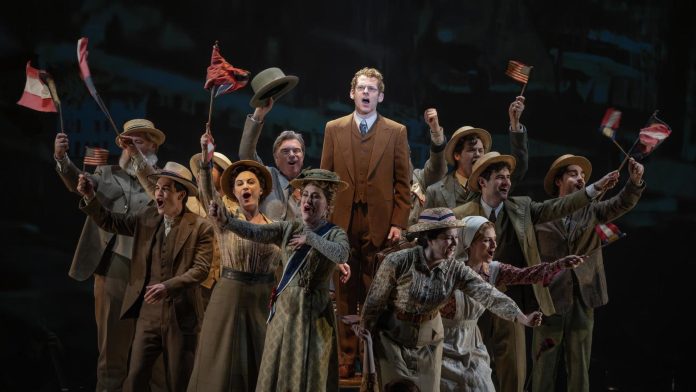
By Shari Barrett
Writers have learned since taking pen to paper that it is best to write what you know. As a Jewish man growing up in Atlanta in the 1940s and 1950s celebrating Christmas and Easter while never attending a seder or following any Jewish traditions, playwright Alfred Uhry was subjected to all the antisemitism that runs rampant through his masterpiece musical Parade now at the Ahmanson Theatre. The production, which won the 2023 Tony Award for Best Revival of a Musical, is the tragic and true story of Brooklyn-born and Jewish Leo Frank who, in 1913, moved to Atlanta with his Southern-raised Jewish wife to manage her uncle’s pencil factory. But from the moment Leo arrives, he cannot accept calling a place that celebrates Confederate Memorial Day as home. And it is that deep-rooted Southern pride which emanates from within the heart of soul of everyone there, along with deep-seated prejudice for others who do not think or look like they do, that fuels the musical’s sad tale.
Leo and his wife Lucille, whose upbringing could have been in Uhry’s family home, have always hidden their true feelings from each other, especially since Leo wants to establish himself by working long hours away from home so they can settle down and start a family. Their bittersweet story, based on truth, reminds us that to love, we must truly see and honor one another. But it’s a lesson learned too late for this devoted couple.
When Leo is accused of raping and murdering 13-year-old Mary Phagan, an employee in his pencil factory, it’s easy to see why he is already guilty in the eyes of those around him simply because he was Jewish. At the center of the musical is Leo’s dramatic courtroom trial, based on true events which were sensationalized by the media to arouse anti-Semitic tensions in Atlanta and the state of Georgia, resulting in the re-birth of the Ku Klux Klan and the creation of the Anti-Defamation League to protect the rights and freedoms of Jewish people. And yet, even to this day, the rise of antisemitism continues to rear its ugly head around the world.
Blessed with a glorious score by Jason Robert Brown whose almost non-stop, character-driven songs propel the truth and lies into crystal-clear focus, Parade is blessed to be led by inventive director Michael Arden who adds in projections designed by Sven Ortel of historical places and people in the trial behind those portraying them. Triple-layer scenic design by Dane Laffrey allows the various levels to take the action from the courtroom, to a streetcar, the Governor’s Mansion, the Frank home, Leo’s office and his prison cell, with the upper level utilized as the main focal point.
Under Music Director and Conductor Charlie Alterman, a 10-piece orchestra lifts the non-stop music into the realm of wondrous perfection, while enthusiastic choreography by Lauren Talango-Grant and Christopher Cree Grant reflects the demeanor of the dissonant lives to a tee. Costumes designed by Susan Hilferty and Mark Koss, with hair and wig design by Tom Watson, add authenticity to Southerners at the turn of the 20th Century. Colorful lighting design by Heather Gilbert includes startlingly bright white lights focused on the audience at life-changing moments, and sound design by Jon Weston allows each voice to be heard, even during the largest ensemble numbers.
But ultimately, Parade cannot succeed without a full cast of triple-threat performers whose voices can raise the roof with solid harmonies and emotionally-stirring character portrayals. At the musical’s center is the extraordinary Max Chernin as Leo Frank who will tear at your heartstrings during “It’s Hard to Speak my Heart” during his trial, and Talia Suskauer as his wife Lucille Frank who learns her true value as an equal partner in their marriage, exemplified during “Do It Again,” “This is Not Over Yet,” and “All the Wasted Time.” Their heartfelt portrayals and duets brilliantly lead us into the heart and soul of their characters and marriage as it develops into a true partnership in the face of unbearable hardship. And it makes the ending even more heartbreaking.
Each cast member is to be commended for their stunning, triple-threat character portrayals and glorious voices with stand-outs including Chris Shyer as Governor Slaton and Alison Ewing as his wife Sally who rule the roost Southern-style during “Pretty Music” then add a true moment of hopefulness for humanity when they question the evidence leading to Leo’s sentencing; Olivia Goosman as the young and innocent Mary Phagan with a ribbon in her hair and balloon in her hand, whose duet “The Picture Show” with Jack Roden as Frankie Epps convinces us to really care about her before tragedy strikes; “The Factory Girls” Iola, Essie and Monteen (Sophia Manicone, Emily Rose DeMartino, Bailee Endebrock) who testify that Leo lured them to “Come Up to My Office” in which Chernin effectively morphs into the lecher most of the town thinks he really is; and Jenny Hickman as Mary Phagan’s mother whose tearful “My Child Will Forgive Me” sways the court to rule against Leo.
Others of note are Trevor James as the Young Soldier who sings of “The Old Red Hills of Home” as he prepares to march off into the Civil War believing in the South’s swift victory; Andrew Samonsky as prosecutor Hugh Dorsey who senses “Somethin’ Ain’t Right” and manipulates testimonies to suit his political aspirations; Evan Harrington whose Judge Roan sentences Leo to death, then later sings about “The Glory” of Southern life while fishing with Hugh Dorsey; Ramone Nelson as Jim Conley, the janitor at the pencil factory and witness to the crime, whose true nature is exemplified during the chain gang inspired “Blues: Feel the Rain Fall”; and Danielle Lee Greaves as Minnie McKnight, housekeeper for the Franks whose “Minnie’s Testimony” seals Leo’s fate.
Michael Tacconi portrays newspaper reporter Britt Craig who always looks for any “Real Big News” but then learns a valuable lesson about using fake news to sell papers; Prentiss E. Mouton as Riley and Oluchi Nwaokorie as Angela who open Act II with “A Rumblin’ and a Rollin’” which gives us an upstairs, downstairs look into the their lives at the Governor’s Mansion, revealing how they play submissive roles while working as opposed to how they really feel about the way they are treated; and Griffin Binnicker as Tom Watson, a good old Southern boy who promotes hatred against anyone who is not white and a Southern Christian, whose ability to manipulate people is highlighted during the rousing “Where Will You Stand When the Flood Comes?” along with Hugh Dosey, Frankie Epps, and the company.
It’s a question aimed at every member of the audience, demanding us to consider whether we will stand up for what believe is right or follow others’ opposing opinions when an important choice must be made. And isn’t that what’s going on in America right now? This extraordinary Broadway-quality production offers much for us to consider about how our society is being manipulated – and is NOT TO BE MISSED!
Parade performances take place at Center Theatre Group’s Ahmanson Theatre at the Music Center through July 12 on Tuesday-Friday at 8 p.m., Saturday at 2 p.m. and 8 p.m., Sunday at 1 p.m. and 6:30 p.m., and Thursday July 10 at 2 p.m. Dark Mondays. Runtime: 2 hours and 30 minutes, including one 20-minute intermission. All-in pricing tickets start at $40.25. Recommended for ages 13+ due to graphic violence, themes of racism, anti-Semitism, and white supremacy. Production contains theatrical haze and flashing lights. More info and tickets at https://www.centertheatregroup.org/


















